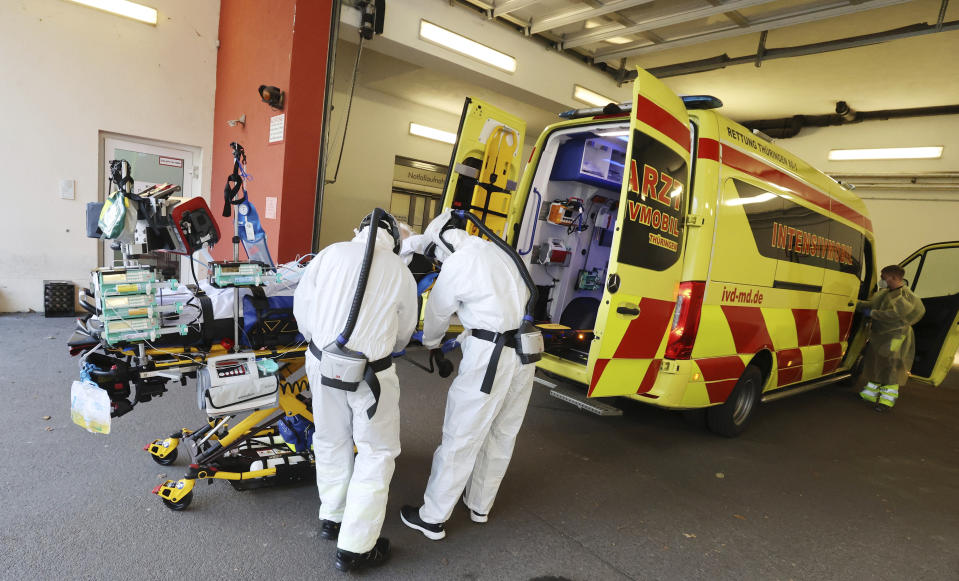'Hoodwinked' before Christmas, EU nations seek to slow virus
- Oops!Something went wrong.Please try again later.
THE HAGUE (AP) — Nations across Europe took new measures Friday in an attempt to keep a COVID-19 spike from spiraling out of control, hoping that action now will safeguard the joys of Christmas next month.
A spike in cases fueled by the contagious delta variant forced governments to act to rein in infections even in countries not seeing surges and where vaccination rates are high.
Meanwhile, the world on Friday was confronted with yet another challenge in its long pandemic ordeal: the discovery of a new, potentially more transmissible COVID-19 variant found in southern Africa.
In Belgium, where a spike in cases and hospital admissions exceeded even the worst medical predictions, Prime Minister Alexander De Croo reinforced measures for the second time in little more than a week and closed night clubs, while bars and restaurants have to close at 11 p.m. for the next three weeks.
“We have been hoodwinked by the delta variant,” he said.
Referring to the more than 25,000 cases a day now in the country of 11 million, he said: “This is unprecedented in our country.”
Neighboring Netherlands has been struggling with the virus just as much.
Health Minister Hugo De Jonge said that hospitals across the Netherlands have been told to wind back planned surgeries and scale up acute care and intensive care beds to 1,350 nationwide to cope with the rising number of COVID patients.
The Dutch government is also expected to announce an expansion of a partial lockdown that has been in place for two weeks amid swiftly rising infections and ICU admissions.
Caretaker Prime Minister Mark Rutte and De Jonge are scheduled to give a televised news conference at 7 p.m. (1800 GMT) to outline the new measures.
Bars and restaurants that already have to close their doors at 8 p.m. could be ordered to shut even earlier. “That we need measures — tough measures — is beyond doubt,” De Jonge said Thursday.
He said a panel of experts that advises the government on its coronavirus policies has advised measures that will force a turnaround in the rising line of infections.
“That turnaround won’t happen on its own,” De Jonge said.
In Spain and Portugal, where rates of infections are lower than most of Europe, authorities were also reinstating previous restrictions or adding new ones.
In Spain, despite having fully vaccinated 79% of its 47 million residents and hospital admissions increasing at a slower pace than in previous surges, the mandatory use of the so-called COVID-19 passes is becoming widespread.
In northeastern Spain’s Catalonia the passes were supposed to become mandatory from Friday to enter bars, restaurants, gyms, nightclubs and nursing homes. But authorities in the region said they were temporarily halting the order due to an overwhelming number of requests for the passes.
The Catalan health department said in a statement that it had received more than 700,000 requests for the passes in the four days leading to Friday. Health authorities said that implementing the mandatory passes will be reconsidered next week.
In Portugal, less than two months after scrapping most of the pandemic’s tighter restrictions, the government on Thursday announced it would restore some of the measures such as mandatory face masks in enclosed spaces or the digital certificate required to enter some venues. Even inoculated people must have a negative test to visit hospitals, elderly care homes, sports events and bars and discos.
And in Italy, where the COVID situation was under control compared with neighbors like Austria, mayors in cities including Milan, Bologna, Padova and Bergamo, were imposing mask mandates for the holiday season. New restrictions also were expected in Rome.
Denmark, meanwhile, said Friday that it plans to start offering COVID-19 vaccination shots to children from 5 to 11 years beginning this weekend after the European Union regulator authorized Pfizer’s vaccine for kids on Thursday.
“Our assessment is that by offering children in the target group, we can increase immunity and break down infection,” said Helene Probst, deputy head of the Danish Health Authority. “We need this.”
She said Denmark is "in the midst of a historic health crisis.”
____
Corder reported from The Hague, Netherlands. Associated Press writers Colleen Barry in Milan, Aritz Parra in Madrid, Barry Hatton in Lisbon and Jan M. Olsen in Copenhagen contributed.


